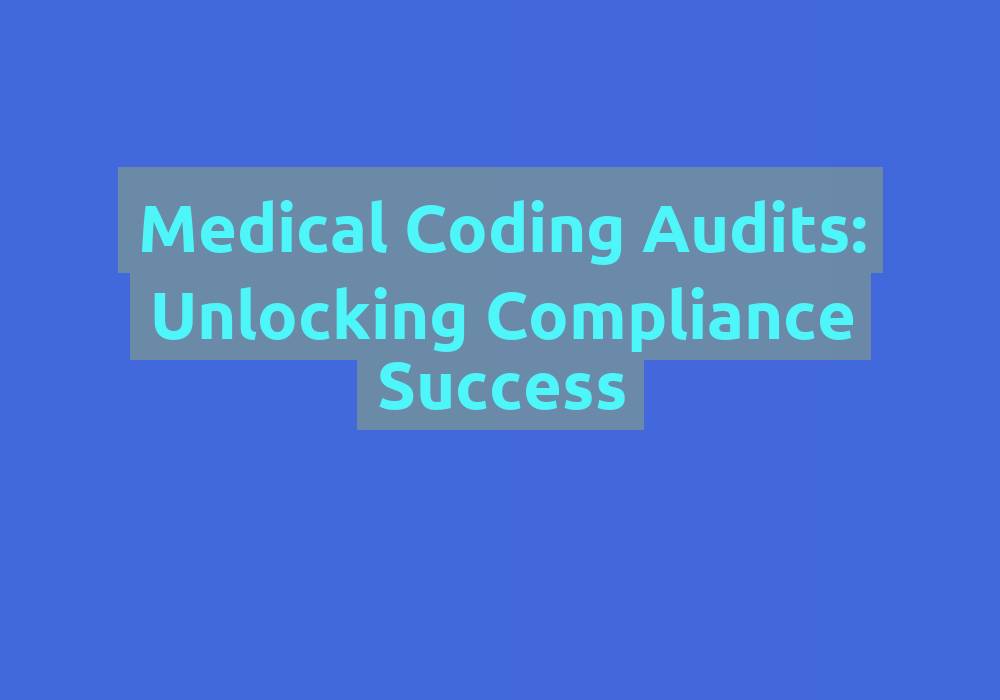Medical Coding Audits: Essential for Effective Risk Mitigation
Medical coding audits are a fundamental component of the healthcare industry as they play a vital role in ensuring accuracy, compliance, and effective risk mitigation. Given the continuously changing healthcare landscape, it is increasingly crucial for healthcare providers to adopt robust coding audit processes that can stand the test of time. This article will explore the profound significance of medical coding audits and how they effectively contribute to risk mitigation within healthcare organisations.
Comprehending the Vital Role of Medical Coding Audits
Medical coding audits entail a thorough and systematic examination of medical documentation, coding practices, and billing processes to ensure adherence to established industry standards, guidelines, and regulatory frameworks. These audits can be performed by both internal auditors and external auditors, each equipped with extensive expertise in medical coding and billing. The importance of these audits cannot be overstated, as they serve as a mechanism for ensuring the integrity of the coding and billing processes.
The core objective of medical coding audits is to pinpoint any inconsistencies, mistakes, or potential fraudulent behaviours within the coding and billing processes. By conducting regular audits, healthcare organisations can take a proactive stance in identifying and addressing coding errors, thereby ensuring the accurate submission of claims and the rightful reimbursement for services rendered. This vigilance helps maintain the financial health of the organisation while also ensuring trust and reliability in the system.
Understanding the Critical Importance of Risk Mitigation in Healthcare

Risk mitigation stands as a cornerstone of effective healthcare operations, as it aims to reduce potential financial, legal, and reputational risks. Inaccurate coding and billing practices can lead to a series of adverse outcomes, including claim denials, overpayments, compliance breaches, and even legal penalties. Furthermore, such inaccuracies can severely impact a healthcare provider’s reputation and erode patient trust, which are invaluable assets in the healthcare sector.
By implementing comprehensive and robust medical coding audit programmes, healthcare organisations can effectively manage these risks. Regular audits are instrumental in uncovering coding inaccuracies, compliance deficiencies, and potential fraudulent activities that may arise, allowing organisations to rectify these issues promptly before they escalate into significant challenges. This proactive strategy not only ensures adherence to regulatory standards but also protects the financial integrity and reputation of the healthcare provider.
Exploring the Key Benefits of Medical Coding Audits
-
Ensuring Compliance with Regulations: Medical coding audits are essential for healthcare organisations to maintain compliance with various industry regulations, including the Health Insurance Portability and Accountability Act (HIPAA), Centers for Medicare and Medicaid Services (CMS) guidelines, and other relevant coding standards. Adhering to these regulatory frameworks is crucial for avoiding penalties, legal repercussions, and damage to the organisation’s reputation.
-
Identifying and Rectifying Coding Errors: Audits are invaluable in pinpointing coding errors, such as incorrect code assignment, unbundling, upcoding, and undercoding. These inaccuracies can lead to claim denials, overpayments, or underpayments that significantly affect the revenue cycle. By identifying and correcting these errors promptly, healthcare organisations can optimise their revenue and minimise financial risks.
-
Preventing Fraudulent Activities: Medical coding audits play a crucial role in uncovering potential fraudulent activities, including the deliberate misrepresentation of services, falsification of medical records, and billing for services that were never rendered. By identifying and addressing these fraudulent practices, healthcare organisations protect themselves from significant legal and financial consequences.
-
Enhancing Documentation Accuracy: Audits focus on not only the accuracy of coding but also the quality of medical documentation. Comprehensive and precise documentation is vital to support the services rendered and to justify the codes assigned. Through audits, healthcare providers can uncover documentation gaps and provide the necessary education and training to enhance overall accuracy.
-
Improving Revenue Cycle Management: By identifying and correcting coding errors, audits significantly contribute to a more efficient revenue cycle. Accurate coding ensures appropriate reimbursement, minimises claim denials, and reduces the need for costly appeals. Additionally, audits help streamline billing processes, facilitating timely claims submission and reducing instances of revenue leakage.
Strategies for Implementing Effective Medical Coding Audits
To guarantee the effectiveness of medical coding audits, healthcare organisations should adhere to several best practices:
-
Establishing Clear Coding Policies and Procedures: Implementing clear coding policies and procedures that outline guidelines for accurate coding and billing is essential. These policies should align with current industry standards and regulations and be effectively communicated to all staff members involved in the coding and billing processes to ensure consistency and accuracy.
-
Conducting Regular Internal Audits: Performing regular internal audits is vital for identifying coding errors and compliance gaps early on. Internal auditors should possess the necessary expertise and stay updated with the latest changes in coding guidelines and regulations to effectively perform their roles.
-
Engaging External Auditors for Unbiased Assessments: External auditors offer an objective viewpoint and possess in-depth knowledge of best practices within the industry. By engaging external auditors for periodic assessments, healthcare organisations can receive an unbiased evaluation of their coding practices and identify critical areas for improvement.
-
Investing in Continuous Education and Training: Healthcare organisations should prioritise continuous education and training initiatives for their coding and billing staff. Regular training sessions help ensure that they remain informed about current coding guidelines, regulatory updates, and documentation requirements, thereby enhancing the overall accuracy of coding practices.
-
Leveraging Advanced Technology Solutions: The adoption of advanced technological solutions, such as automated coding software and computer-assisted coding tools, can significantly boost the accuracy and efficiency of coding audits. These tools streamline the auditing process, identify potential errors, and provide valuable insights for effective risk mitigation.
In summary, medical coding audits are integral to risk mitigation within the healthcare industry. By ensuring compliance, identifying coding errors, preventing fraudulent activities, improving documentation accuracy, and enhancing revenue cycle management, audits contribute significantly to the financial health, reputation, and overall success of healthcare providers. By adhering to best practices and leveraging advanced technology solutions, healthcare organisations can implement effective coding audit programmes that mitigate potential risks effectively.
Frequently Asked Questions About Medical Coding Audits

1. What is the primary purpose of medical coding audits?
Medical coding audits are carried out to identify discrepancies, errors, and potential fraudulent activities in the coding and billing processes. They ensure the accurate submission of claims, proper reimbursement, and compliance with established industry standards and regulations.
2. How do medical coding audits contribute to effective risk mitigation?
Medical coding audits assist in mitigating financial, legal, and reputational risks by proactively uncovering coding errors, compliance gaps, and potential fraudulent activities. By addressing these issues before they escalate, healthcare organisations protect their financial stability and safeguard their reputation.
3. What are the primary benefits of conducting medical coding audits?
The primary benefits of medical coding audits include ensuring compliance with industry regulations, identifying and rectifying coding errors to maximise revenue, preventing fraudulent activities, enhancing documentation accuracy, and improving overall revenue cycle management.
4. What best practices should be followed for effective implementation of medical coding audits?
To ensure the successful implementation of medical coding audits, healthcare organisations should establish clear coding policies and procedures, conduct regular internal audits, engage external auditors for objective assessments, invest in continuous education and training programmes, and leverage technology solutions such as automated coding software and computer-assisted coding tools.
Originally posted 2023-06-07 17:24:21.
The post Medical Coding Audits: Essential for Effective Risk Mitigation appeared first on Healthcare Marketing Service.



